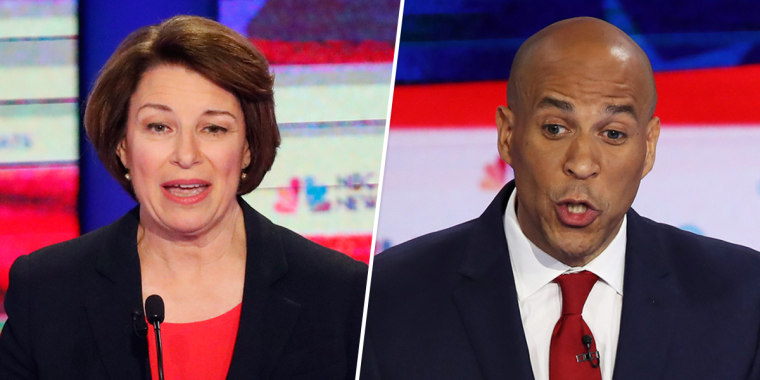MIAMI — Ten candidates entered. Ten candidates left. But some were better off than the others.
The first night of the first Democratic presidential debate Wednesday offered many Americans their first real look at the sprawling 2020 field and gave the candidates a chance to try to break out from the pack.
Download the NBC News app for full coverage as Biden, Sanders, Harris and Buttigieg face off Thursday from 9 p.m. ET
Here's who won, who disappeared on stage and will hope for better luck next time. (In order of stage appearance.)
New York City Mayor Bill de Blasio: His candidacy has been dismissed as something of a joke, but de Blasio soared over the low bar set for him. He interrupted more than anyone else, but tempered that aggression with effective personal stories about his father.
Rep. Tim Ryan, D-Ohio: Not the strongest night when your most memorable moment was defending the unpopular U.S. military presence in Afghanistan, in an exchange with Tulsi Gabbard in which he also seemed to conflate the Taliban and Al Qaeda: "When we weren't in there, they started flying planes into our buildings." Challenged on his facts by Gabbard, Ryan then noted it was Al Qaeda, a terrorist group that received protection from the Taliban, that carried out the 9/11 attacks.
Former Housing Secretary Julián Castro: In clashing with Beto O’Rourke and displaying his own command of policy issues, an uncharacteristically energetic Castro may have earned himself a second look from Democratic voters.
Sen. Cory Booker, D-N.J.: His presidential run might finally start to get off the ground after a performance in which he spoke more than anyone else, saw spikes of interest on social media, and delivered memorable moments, especially on personal experience with gun violence.
Sen. Elizabeth Warren, D-Mass.: Her first goal was to do nothing to risk her substantial lead in polls over everyone else on stage. She succeeded. No one laid a finger on her and Warren dominated the early part of the debate. She took a big, perhaps calculated, risk by coming out for eliminating private health insurance to create a single-payer system, but that may help her appeal to Bernie Sanders supporters.
Former Texas Rep. Beto O'Rourke: Served as a piñata for several of the other candidates, with de Blasio challenging his defense of private health insurance and Castro chiding him that he hadn't done his “homework" on immigration. The willingness of other candidates to pile on made it a tough night for O’Rourke.
Sen. Amy Klobuchar, D-Minn.: Underperformed. Despite a few strong lines about her Uncle Dick and his guns, Donald Trump and his bathrobe, and the commitment of the women on stage to abortion rights, she had difficulty forming cogent answers to some questions.
Rep. Tulsi Gabbard, D-Hawaii: Seized an opportunity to highlight her military experience in Afghanistan and her signature anti-intervention foreign policy views, without being tainted by her past sympathetic comments on Syrian dictator Bashar al-Assad.
Washington Gov. Jay Inslee: Had a big smile on his face when he finally got to address climate change about three-quarters of the way through the debate, but his presence was rarely felt otherwise.
Former Maryland Rep. John Delaney: While he's more moderate than much of the primary electorate, Delaney got the kind of national exposure that he hasn’t had before and held his own. Used the stage to articulate his opposition to ending private health insurance.
The debate continues Thursday night on NBC News, MSNBC and Telemundo when 10 more candidates will face off, including former Vice President Joe Biden, Sen. Bernie Sanders, I-Vt., and Mayor Pete Buttigieg of South Bend, Indiana.


